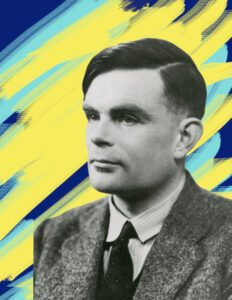Alan Turing was one of the smartest minds of the 20th century. His contributions to mathematics and computer science laid the foundation for the digital world we live in today. Turing’s works in the fields of computability and artificial intelligence, as well as his significant role in deciphering the German enigma codes during World War II, have had a major impact on computer science. Therefore, we look at Turing’s impressive legacy and the implications for our society today.
The path to becoming a math genius
Today, June 23, would have been Turing’s 111th birthday. Born in London in 1912, Turing’s great talent and intelligence became apparent at an early age. His gift was recognized during his school years, earning him a scholarship to study mathematics at King’s College, Cambridge. During his time at Cambridge, Turing made significant contributions to theoretical mathematics, particularly in the field of logic.
The Turing Test: a challenge even modern computers are not up to

One of Turing’s most famous contributions to computer science is the so-called “Turing test.” In 1950, he published his paper “Computing Machinery and Intelligence” with the research question of whether machines exhibit intelligent behavior. The Turing Test is a method for evaluating the intelligence of a machine by asking people to identify whether they are interacting with a computer or a human through text communication. This test has significantly influenced the field of artificial intelligence as we know it and is still used today.
The Turing machine and its impact on today’s computer technology
Besides the Turing test, Alan Turing developed the idea of the Turing machine, which served as a theoretical model for a universal computer. This concept set the groundwork for modern computer technology as we know it today. In addition, the concept of the Turing machine was helpful in understanding computability. Because of the machine, Turing discovered that certain tasks could be solved algorithmically. This, in turn, formed the basis for the development of programming languages and the automation of computations.
Becoming a secret hero of World War II through cryptanalysis
The Turing test and the Turing machine are not the only inventions Alan Turing is renowned for up to this day: during World War II, he worked for British intelligence and was significantly involved in the decoding of the German Enigma machine. Through his impressive work in cryptanalysis, Turing made an important contribution to shortening the war. His work remained secret for a long time but was eventually recognized and honored.
From persecution to royal pardon
Although Turing’s accomplishments in World War II and in the development of computer technology gave him great importance, he was not acknowledged in his lifetime as he deserved to be. Instead, he was persecuted and condemned for his homosexuality. It wasn’t until decades later, specifically in 2013, that Turing received recognition and was granted a royal pardon by Queen Elizabeth II. His work and legacy have had a lasting impact on science and modern society.
Fun Fact:
Alan Turing has been memorialized on the 50-pound note as of 2021 which features the binary code “1010111111110010110011000.” This code can be converted to decimal numbers and reveals Turing’s date of birth on June 23, 1912.
In our blog series, we dedicate ourselves to mathematical geniuses, after whom we have named our meeting rooms here at G&D. You can read our post on the world’s first female programmer, Ada Lovelace, here.
- Built for Live Sports Arena Operations: How KVM Supports Game Day Performance - 12. February 2026
- G&D and VuWall honor outstanding partners at ISE 2026 - 5. February 2026
- Future-Proof Control Rooms: STADLER SYSTEC Relies on G&D Solutions - 30. January 2026

